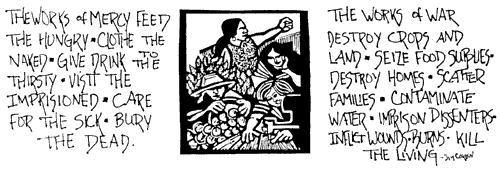I had an urge one day in mid-July of 2001 to walk down to the local soup kitchen and offer a hand. It was hot outside, not quite sweltering, but the midsummer Puget Sound kind of hot that brings out the life in things. I invited a roommate, Jesse, to walk downtown with me, and strolled out the door.
I had never been inside of Bread & Roses. I ran a few 9-1-1 calls there when I was working for the ambulance company, but we always did our work there on the sidewalk outside. It struck me as a run-down kind of place, with lifeless grey concrete walls and big tinted windows. There were no signs on the outside, nothing to identify the purpose of the building but the milling crowds of the poor smoking cigarettes on the sidewalk.
When Jesse and I first stepped through the door, we were confronted with a writhing sea of people. A little girl squealed as her brother chased her down an aisle. A tall, thin black man wearing a beret, a corduroy vest, and a badge emblazoned “sheriff” stood squarely off against the flatware tray, yelling obscenities and threats at the silverware. A line of hungry people stood behind him rolling their eyes and urging him to move along.
There were about 25 or 30 tables in the room, with four or five seats per table. Beyond the dining room, at the back of the building, a long counter cut the room. There were heaping trays of food along the counter, and a number of little old church women wearing white aprons and food handler’s gloves stood behind it armed with serving spoons and cutting knives.
I walked to the back to help serve the food. The line moved quickly and it was very busy for about 20 minutes, and then things began to slow down. A kindly looking middle aged fellow with glasses and a knitted wool sweater approached me, and introduced himself. His name was Phil Tenkhoff. He encouraged me to take a plate of food and to go sit and eat among the guests. I was surprised and delighted at this suggestion and I took him up on it.
I have always been shy around people I don’t know, particularly in crowds. In the last couple years I have gotten much better at being outgoing, but I still often find my tongue to be confounded when I’m in unusual settings. I sat silently, uncomfortably, and ate my food, then scurried back to the kitchen to help wash dishes and escape my discomfort.
I set up in front of a dual utility sink where the dishes were being washed and rinsed by a Hispanic man in his 30’s, and he made room for me to offer a hand. He sang a bit in Spanish as we worked, and then began trying to tell me some jokes. He spoke no English, however, and I spoke no Spanish, but I could tell that the jokes were good, dirty ones gauging from his hand gestures.
As the cleaning was wrapping up and Jesse and I were wiping down tables, a wise, stern looking middle aged woman with salt and pepper hair wearing an apron walked up to us. She tilted her head back a little and sized us up through the bottoms of her spectacles.
“Do you need your paperwork signed?” She asked.
“Paperwork?”
“Yes. You’re doing community service, right?”
I was dumbfounded for a moment. “Well, I suppose we are… is there some kind of paperwork we need to do to volunteer here?”
A light turned on in her eyes, and she grinned for a moment. “Oh, well, you’re just doing this out of the goodness of your hearts! God bless you! I thought you must have had court orders.”
I blushed a little when I realized that most people my age don’t volunteer much in soup kitchens… unless ordered by a court to atone for a crime. The funny thing is that a couple of years later, when I was coordinating the Bread & Roses Advocacy Center, I was court ordered to do community service for an act of civil disobedience. This woman, Selena, ended up getting to sign my papers after all.



